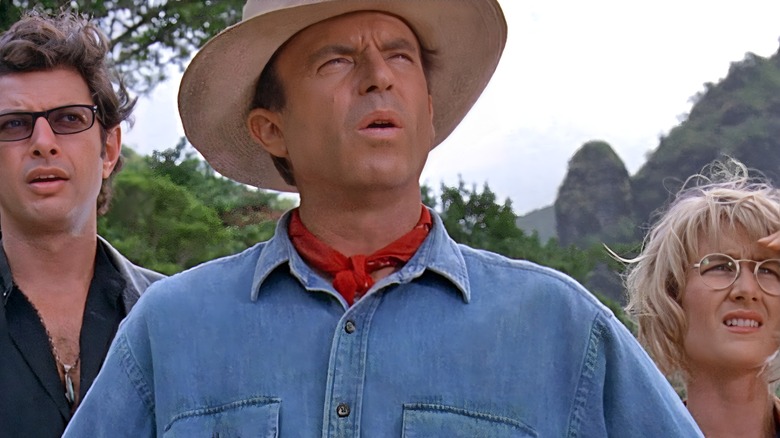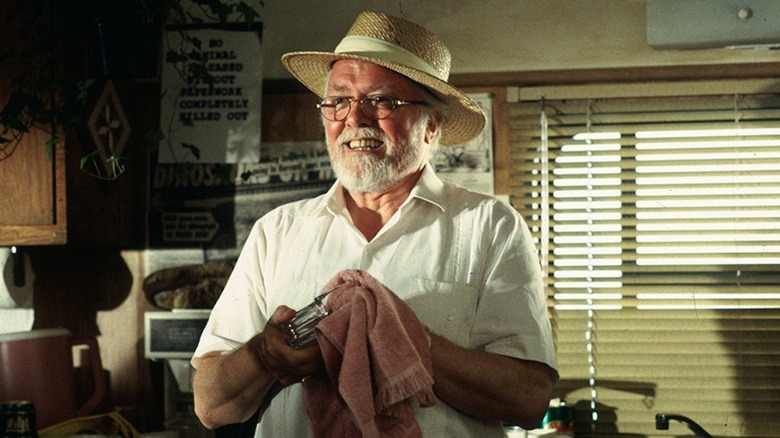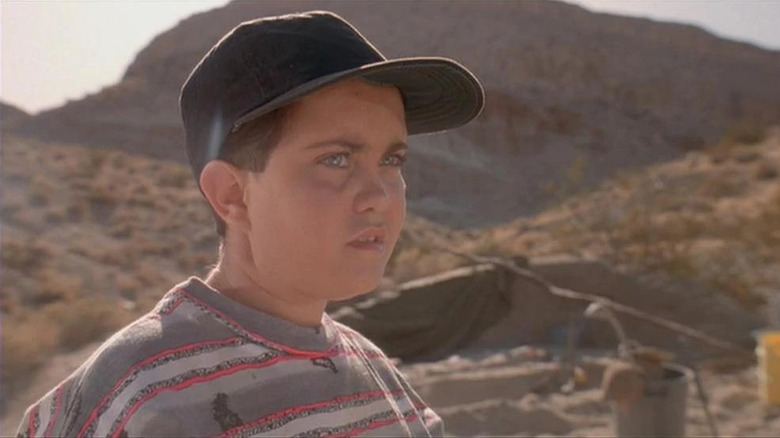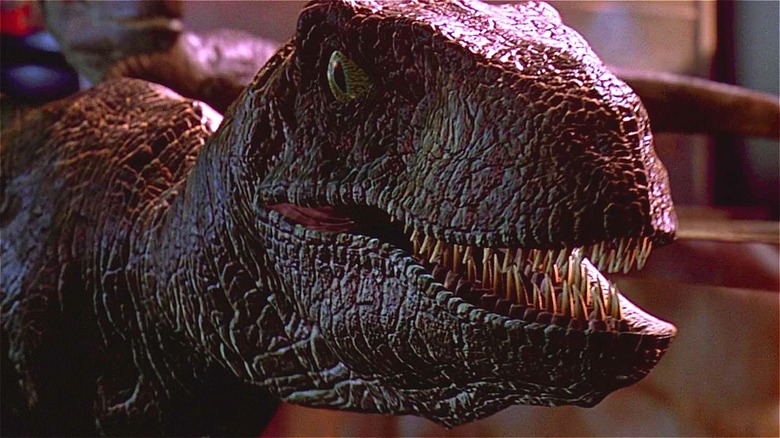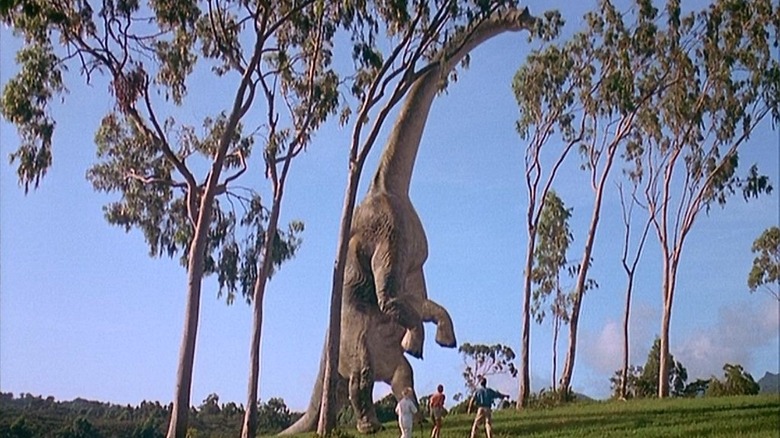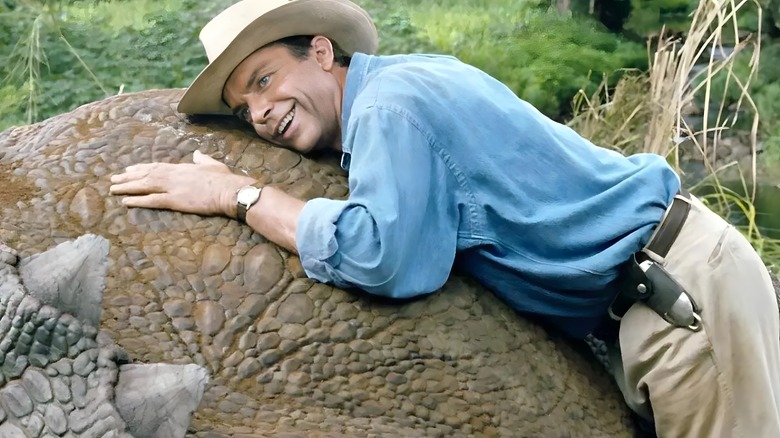I Don't Think This Jurassic Park Thing Sounds Like A Very Good Idea (Dr. Alan Grant Guest Column)
Hello? Is this thing working? Stupid computers ... can't stand them. I would much rather be using a typewriter, but this "laptop" is what my gracious host has provided me with to record my experiences, so I'll have to make do.
It makes a great deal of sense that dinosaurs have captured humanity's imagination so thoroughly and for so long. For one thing, they are perhaps the only indigenous species on this planet that Man had no hand in making extinct. For another, there's still so much we don't know about them; not just their exact look and physiological makeup, but their behavioral patterns, their social skills, their life cycles, and so on. If Mankind is by nature a being with an insatiable thirst for knowledge, the dinosaur represents the ultimate mystery; the missing link between humans and the divine within nature.
That said, this "Jurassic Park" thing sounds like an absolutely god-awful idea.
I certainly understand the interest in such a concept; the possibility of seeing a living dinosaur up close and personal is incredibly intriguing, and the inherent danger of doing so can also be easily mitigated in the name of discovery, in much the same way people study lions, bears, and the like. Yet the possibility of things getting out of control — as my fellow park tour attendee "Doctor" Ian Malcolm likes to mention every chance he gets — is just too great. The world has changed so radically, we're all struggling to catch up, and now dinosaurs and Man are suddenly thrown back into the mix together? I don't know what to expect, but my gut tells me it isn't too good.
Can John Hammond be trusted?
Given my life's work within paleontology, I could easily see myself supporting other scientists and researchers in their quest to bend ethics and morality by potentially bringing a dinosaur to life. As my colleague Jack Horner likes to say, "Scientists who play by someone else's rules don't have much chance of making discoveries."
Yet the fact that Jurassic Park is the brainchild of industrialist John Hammond is what gives me the most pause. The InGen corporation, which he co-founded, has a rather spotty track record when it comes to humane and environmentally conscious business practices, something which all the electric fences surrounding Isla Nublar remind me of. (The rumors I hear about his old business partner, Benjamin Lockwood, are even more ethically dubious.)
Hammond isn't interested in cloning dinosaurs just for purposes of scientific study but is instead trying to make the greatest amusement park on Earth, a goal that seems foolhardy at best and extremely dangerous at worst. After what the Delos corporation did with robots in the 1970s, one would think that a combination theme park and zoo filled with creatures we're still unfamiliar with (and who are unfamiliar with us) would be something to avoid. Although Hammond is seeking my endorsement after this weekend's tour, I highly doubt he'll ever be able to get the park up and running properly — the liability issues alone must be insurmountable, never mind all these computer systems he trusts so much. Despite my verdict, I don't think anyone will be eating at Jurassic Park Margaritaville anytime soon. Hammond has too many kinks to work out.
Sorry — just had a brief issue with the laptop. That odious Nedry character popped up on my screen ranting that I didn't say the magic word or something. He's gone now, must've been a glitch.
People don't have the proper respect for dinosaurs, especially kids
When it comes to an ordinary zoo or nature preserve, people have an inherent understanding of the danger they face as well as the danger they pose. Even if they haven't been educated about the creatures they'll meet, they know enough to have respect for the animals. That's not the case with dinosaurs; for hundreds of years, the dinosaur has been as much a myth as a scientific reality, and thanks to the extinction event that wiped them out, humans tend to have a braggadocious attitude toward them rather than one of respect.
Why, just recently there was a young boy visiting my latest dig site, where I and Dr. Ellie Sattler uncovered the imposing, majestic skeleton of a velociraptor, and this kid said it looked like a six-foot turkey. I made sure to set him straight, telling him that these animals — who had a lot more in common with birds than reptiles, by the way — would've sliced his guts open before he even had time to dismissively make fun of their looks. I think he got the point.
Still, how can we hope that children will understand the danger and threat that these dinosaurs pose when everyone at Jurassic Park thinks of them more as entertainment attractions? It's a juvenile approach to what is ultimately intended as a park for juveniles. You certainly won't catch me here after this weekend, and definitely not in the company of any children!
Breeding raptors is probably not very smart
While I'm on the subject of not understanding the threat of dinosaurs: the park's game warden, Muldoon, just showed myself, Malcolm, and Dr. Sattler their raptor pen. While we didn't see any actual raptors as the staff attempted to feed them, I have the sinking feeling that's precisely because the raptors didn't wish to be seen, just as they don't wish to be fed. You can't suppress instinct, after all! Their obvious intelligence was fully demonstrated, even in that small way.
I truly hope not to see a Raptor while I'm here, likely because seeing one up close would probably mean it's closing in for the kill. While the viciousness and intelligence of this animal undoubtedly appeal to Hammond and Dr. Henry Wu as a selling point and a challenge, respectively, I can't emphasize enough the danger they pose. Sure, most of the apex predator animals that we're used to have a verifiable pattern of behavior and intelligence that we can plan for, but who knows what these raptors could be capable of learning in the 20th century. At least the T-Rex (which Hammond assures me they have here) has a built-in Achilles heel — if these raptors learn how doors work, for instance, it could be a big problem.
I suppose if they insist on keeping these raptors around, we might as well try making friends with them. It won't work, but it's worth a shot.
OK, the Brachiosauruses do look pretty neat
I realize I've been doing a lot of naysaying in this column; so as not to make Mr. Hammond too upset, let me admit that what he and his team of geneticists and scientists have done here, foolish or not, is remarkable. I don't think I'll ever have as awe-inspiring a moment in the rest of my life as when I first saw some brachiosaurus promenading past a lake — it felt as if some unheard music was swelling as I laid eyes on them. Seeing their thirty-foot-necks, learning that they're warm-blooded; decades of paleontological conjecture vaporized in front of my eyes, and it was absolutely thrilling.
Another milestone: I just met my favorite Dinosaur, the triceratops. Poor thing is sick, but Ellie is staying behind to look after it, so I know she's in good hands. It was incredible just to feel the Trike breathing, and it was at that moment I felt I could be seduced by the promise of Jurassic Park, the promise that these seemingly-magical creatures could come to life before my eyes and could co-exist with us.
I'm not sure if I'm endorsing Jurassic Park
That promise is likely just another John Hammond fairy tale, though. So far, everything seems under control, but it feels like things could go awry at any point.
Honestly, as much as I'm enjoying seeing these animals walking the Earth again, I'd much rather Hammond had spent his money on some animatronic Raptors that would say my name when I walked by them or something instead. These dinosaurs look as uncannily real up close as most expensive animatronics do, anyway, even though I'm sure everyone will be talking for years about the newfangled CGI (Concentrated Genetic Information) Hammond's team came up with instead. Using this technology to create a nature preserve or scientific experiment would've been one thing; turning it into a Disneyland-like ride featuring "Mr. DNA" is quite another.
Still, as a man of science, I'm willing to reserve final judgment. We're about to continue the Jeep tour through the park, though things might be delayed as there is apparently a tropical storm rolling in. As such, this laptop might be down for a while, so I'll have to report back with further findings tomorrow.
Whatever happens, I don't think I'll regret coming here — this is, after all, an adventure 65 million years in the making!
